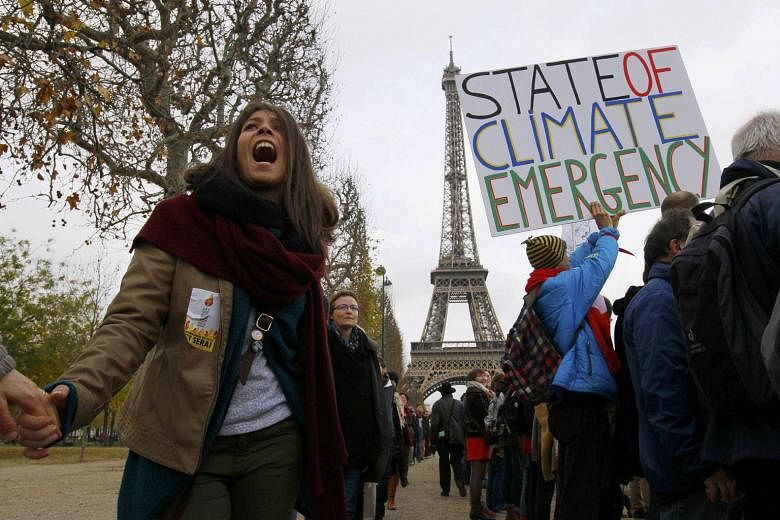PARIS - The historic climate change deal in Paris, sealed after two weeks of intense negotiations, has steered the world away from catastrophic climate change.
The Paris agreement doesn't immediately solve the threat from climate change. This year is set to be the hottest on record and millions are already affected by floods, more intense storms, withering droughts, heatwaves and higher seas that are eroding coastlines in rich and poor nations.
Instead, the pact embraces actions by all nations, whether rich or poor, and creates a long-term blueprint that guides countries in cutting emissions by increasingly deeper increments to try to prevent the planet from overheating. The deeper the cuts and the faster the action, the less risk we will face a future marred by rapidly rising seas and spiralling losses from deadly weather-related disasters.
The agreement, which takes effect in 2020, resets global climate change efforts, which have been marred for over two decades by deep differences between rich and poor nations over who should make the deepest emissions cuts and who should pay for them. As the differences grew, so did the greenhouse emissions and climate change impacts.
The festering row caused deep distrust within the UN climate negotiations. That mistrust culminated in the failed 2009 climate talks in Copenhagen and nearly derailed the talks process altogether.
The Paris agreement represents four years of tough bargaining to restore trust in the UN talks and the deal involves all nations in cutting emissions, but also takes into account the different abilities and circumstances of poorer nations.
It also represents a massive groundswell of support from people around the globe and businesses who want tougher action and tougher policies to curb greenhouse gas emissions, both to drive investment towards greener energy, but also to protect the most vulnerable countries.
The UN climate chief Christiana Figueres on Saturday spoke of a tsunami of climate action that had become irreversible. She said the Paris pact was an "agreement of conviction, an agreement of solidarity with the most vulnerable. It is an agreement of long-term vision because it is an agreement of commitment to turn this new legal framework into the engine of safe growth for all."
The heart of the agreement is ratcheting up the climate action plans that nearly 190 nations submitted prior to the Paris meeting. Those plans are a mix of hard emissions caps, renewable energy goals, energy intensity reduction targets, to pledges to reforest large areas.
Under the Paris agreement, those pledges will be regularly reviewed and strengthened, with nations obliged to submit new and stronger action plans every five years.
New technologies will help nations wean themselves off dirty fossil fuel energy and to use energy much more efficiently.
"The technology revolution is breath-taking and by 2020, countries are going to be able to do a lot more than they think they can now. And I think this creates that global moment where we encourage them to do more," said Mr Alden Meyer, director of strategy and policy at the Union of Concerned Scientists, a Washington-based think-tank.
The global climate deal is basically a new economic blueprint for the planet because it aims to cut greenhouse gas pollution from burning fossil fuels, deforestation and agriculture that is heating up the atmosphere and oceans.
NGOs have said the agreement signals the end of the global dependence on coal, oil and gas. While these will still be in the energy mix for some years to come, scientists say the world will have to quickly peak its carbon emissions and then shift to net zero carbon emissions by using renewable energy, green transport and ending deforestation.
Current INDCs put the world on a path to warm about 3 deg C, a level that would trigger deadly climate change. The Paris agreement says the temperature goal for all nations is warming of well below 2 deg C to aim for 1.5 deg C. That signals a rapid shift away from carbon-intensive economies.
"If sincerely operationalised, the Paris agreement will induce the decarbonisation of the world economy by the middle of this century," said Professor Hans Joachim Schellnhuber, director of the Potsdam Institute for Climate Impact Research in Germany.
The agreement, he said, "is a turning point in human enterprise where the great transformation towards sustainability begins."


